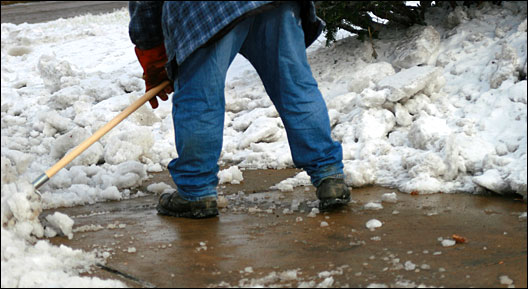severe weather
-
Ask Umbra on combating climate denial
Send your question to Umbra! Q. Dear Umbra, This “year with no summer” and some alleged statistics I have seen quoted about earth-wide temperatures for the last ten years have resulted in claims that the earth is not heating — it may even be cooling. What about it? Arthur WaskowShalom Center, Philadelphia A. Dearest Arthur, […]
-
How to build resilient communities in a chaotic world
This is a guest essay by Chip Ward, a former grassroots organizer/activist who has led several successful campaigns to hold polluters accountable. He described his political adventures in Canaries on the Rim: Living Downwind in the West and Hope's Horizon: Three Visions for Healing the American Land. This post was originally published at TomDispatch, and it is republished here with Tom's kind permission.
-----
Now that we've decided to "green" the economy, why not green homeland security, too? I'm not talking about interrogators questioning suspects under the glow of compact fluorescent light bulbs, or cops wearing recycled Kevlar recharging their Tasers via solar panels. What I mean is: Shouldn't we finally start rethinking the very notion of homeland security on a sinking planet?
Now that Dennis Blair, the new Director of National Intelligence, claims that global insecurity is more of a danger to us than terrorism, isn't it time to release the idea of "security" from its top-down, business-as-usual, terrorism-oriented shackles? Isn't it, in fact, time for the Obama administration to begin building security we can believe in; that is, a bottom-up movement that will start us down the road to the kind of resilient American communities that could effectively recover from the disasters -- manmade or natural (if there's still a difference) -- that will surely characterize this emerging age of financial and climate chaos? In the long run, if we don't start pursuing security that actually focuses on the foremost challenges of our moment, that emphasizes recovery rather than what passes for "defense," that builds communities rather than just more SWAT teams, we're in trouble.
Today, "homeland security" and the Department of Homeland Security (DHS), that unwieldy amalgam of 13 agencies created by the Bush administration in 2002, continue to express the potent, all-encompassing fears and assumptions of our last president's Global War on Terror. Foreign enemies may indeed be plotting to attack us, but, believe it or not (and increasing numbers of people, watching their homes, money, and jobs melt away are coming to believe it), that's probably neither the worst, nor the most dangerous thing in store for us.
-
Geoengineering what?
China fires chemicals into the clouds to try to stimulate rain to end the drought. Days later, a huge and unexpected snowfall closes the highways into and out of the northern provinces, effectively shutting off economic activity.
Discuss.
-
What does economic 'recovery' mean on an extreme weather planet?
This is a guest essay by Tom Engelhardt, co-founder of the American Empire Project and an editor of the Nation Institute's TomDispatch.com. Englehardt is also the author of The End of Victory Culture and the editor of The World According to TomDispatch: America in the New Age of Empire. This post was originally published on TomDispatch and is republished here with Tom's kind permission.
-----
It turns out that you don't want to be a former city dweller in rural parts of southernmost Australia, a stalk of wheat in China or Iraq, a soybean in Argentina, an almond or grape in northern California, a cow in Texas, or almost anything in parts of east Africa right now. Let me explain.
As anyone who has turned on the prime-time TV news these last weeks knows, southeastern Australia has been burning up. It's already dry climate has been growing ever hotter. "The great drying," Australian environmental scientist Tim Flannery calls it. At its epicenter, Melbourne recorded its hottest day ever this month at a sweltering 115.5 degrees, while temperatures soared even higher in the surrounding countryside. After more than a decade of drought, followed by the lowest rainfall on record, the eucalyptus forests are now burning. To be exact, they are now pouring vast quantities of stored carbon dioxide, the greenhouse gas considered largely responsible for global warming, into the atmosphere.
In fact, everything's been burning there. Huge sheets of flame, possibly aided and abetted by arsonists, tore through whole towns. More than 180 people are dead and thousands homeless. Flannery, who has written eloquently about global warming, drove through the fire belt, and reported:
-
CNN, ABC, WashPost, and AP blow Australian wildfire, drought, heat-wave story
If the U.S. media refuse to make the connection between record breaking wildfire, drought, and heat waves and human-caused global warming, why would anyone be surprised if the U.S. public doesn't put it as a higher priority or make the connection itself (see here)?
Australia knows it's facing climate-driven impacts that threaten it with complete collapse (see here). AFP (French international media) get this: "Australian wildfire ferocity linked to climate change: experts." So does Reuter's climate change correspondent in Asia: "Australia fires a climate wake-up call: experts."
I saw the CNN and ABC stories, and you can read the AP's stories, which have been published in the Washington Post and NY Times (though the NYT redeemed itself, see below). The media love a good calamity of Biblical proportion:
-
The rundown on eco-friendly ice melt
Shovel more, salt less. In my family, perhaps in every family, there are stories so apocryphal that a simple phrase becomes a stand-in for the whole tale. One of ours is “salting the plants.” That refers to the time my mother, a high-school student prone to merry pranks, snuck in to her school dining […]
-
NWF VP believes we'll see a cap-and-trade bill this year, and 'Waltzing Matilda' isn't about dancing
First, one of my favorite tunes, "Waltzing Matilda," has nothing to do with dancing.
Second, somebody out there thinks Congress might actually put a climate bill on Obama's desk this year.
First things first. So I'm singing to my daughter, reworking the lyrics to the "the unofficial national anthem of Australia," to distract her from her quest to watch videos on my PC, and she cleverly asks to see a "Waltzing Matilda video." And this is what I find on YouTube:
Turns out the song is about an Australian hobo, who gives the name Matilda to his swag -- his "bed roll that bundled his belongings." Turns out "waltzing Matilda" is slang for traveling with all one's belongings on one's back.
Given where Australia is headed -- "Australia faces collapse as climate change kicks in" -- and for how long (if we don't act soon and strongly to stop it) -- Climate change "largely irreversible for 1,000 years," with permanent Dust Bowls around the globe -- I'm now thinking that Waltzing Matilda will eventually be the official national anthem of Australia. But I digress.
So who is this mystery person who thinks we are on the fast track for climate action?
-
Massive flooding in western Washington linked to man-made causes
After digging itself out of "Snowmageddon" over the holidays, western Washington was hit with heavy rainfall this week, causing massive flooding. Roads, including major arteries like I-5 (pictured above), are closed and entire neighborhoods evacuated.
Sure, Seattle's known for its rain, but this is ridiculous! So who's responsible? Well, us, it turns out.
Scientists say a man-made triple whammy of logging, development, and climate change are to blame. And we shouldn't be surprised ...
A year ago (almost to the day), University of Washington geologist David Montgomery issued a warning to state legislators about the flooding that ravaged the region in 2007:
-
The real cost is the cost of doing nothing
That's always the mantra: Serious climate policy is too pricey, especially in this economy.
To that I say: Watch this excellent video from King 5 News. (It's almost 16 minutes long, but well worth it.) The impacts of climate change, such as flooding, carry a very steep cost. And judging by the video, the costs aren't mostly borne by the rich -- they're paid for by those who can least afford it.
I want to be perfectly clear.The floods in Western Washington -- this year and in several recent years -- are completely consistent with what the climate science has been predicting for the Northwest. It doesn't really matter whether these particular floods are the direct result of global warming (that's an untestable hypothesis),what matters is that this is exactly what we should expect in the future. If the scientists are right, get ready for more.
So if you think carbon pricing is too expensive, just wait until you see the bill for failing to put a price on carbon.



